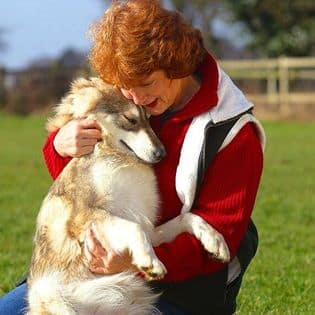
info@janfennellthedoglistener.com
Home / Challenging Traditional Teaching Theories- For the Sake of Our Dogs

Getting a dog is a considered acquisition and must be given a great deal of thought before going through the process.
Once this decision Is taken, we accept we will give many years investment into building a warm, trusting, and loving relationship between the dog and ourselves.
Having made such an important decision and hopefully, before the dog/puppy joins our family, I hope everyone will take time to choose the method they wish to adopt in order to ‘train’ the dog that they want to be their companion for the next 12-15 years.
This decision should start with changing the traditional thinking from ‘training’ the dog’, to rather teaching the owner, and how the owner can help their dog adapt to cope in our human world, a world that is far from natural for the dog.
The world we live in has changed so much since the industrial revolution, to something that would be unrecognisable to any of our ancestors from just a couple of hundred years ago. However, we expect our dogs, who live by rules that have been in place for millions of years, to fully understand what is happening around them now.
When trying to help our dogs cope with this unnatural environment, the first question you should ask yourself must be is “is the way I am going to adopt for my dogs be acceptable if it were to be used on me, or my own children?”
There are many examples of “training” behaviour that we seem to have adopted as normal, such as smacking the dog on the nose if it soils in the house, being jerked on a lead to make it walk by your side, shouting correction if a dog barks at someone coming to the front door.
How can we possibly expect a dog to understand what is required of it, without being patient with our dog and showing it what it is we actually we want, whilst trying to make the process enjoyable for our companion?
Just because a traditional way of working with dogs is accepted by the majority does not make it right.
Of course, we understand that traditional training practices constantly evolve, but in our dogs’ case, we are trying to understand a language that, for them, has been in place and unchanged for millions of years; that language does not change with every new training fad that comes along.
People continue to refer to their dogs as their “babies”, seeing themselves as their pets’ parents, but they will still allow, and even pay for, an outsider to help them, who will encourage them to abuse their new family member under the umbrella term of “Dog Training”.
Dominance based “Dog Training” is complete and utter rubbish; we would never wish to dominate any of our family members to do as we wish, so why would we want to do it with our dogs?. Whilst we want to be responsible for our dog’s physical welfare, we also have the responsibility to be their protector; their defender from psychological and physical damage; we must be their leader. We must search for a kind and successful way to teach our dogs what is required of them, living in our world.
Often love is not enough when attempting to teach our dogs. We must do what is right for them. Only when we, as owners, have provided all that a dog needs to be able to survive in our world, can we know we have done the most loving thing that we can do for our best friends.
Sincerely,
,Jan Fennell



info@janfennellthedoglistener.com
© 2022 Jan Fennell The Dog Listener.
| Cookie | Duration | Description |
|---|---|---|
| cookielawinfo-checkbox-analytics | 11 months | This cookie is set by GDPR Cookie Consent plugin. The cookie is used to store the user consent for the cookies in the category "Analytics". |
| cookielawinfo-checkbox-functional | 11 months | The cookie is set by GDPR cookie consent to record the user consent for the cookies in the category "Functional". |
| cookielawinfo-checkbox-necessary | 11 months | This cookie is set by GDPR Cookie Consent plugin. The cookies is used to store the user consent for the cookies in the category "Necessary". |
| cookielawinfo-checkbox-others | 11 months | This cookie is set by GDPR Cookie Consent plugin. The cookie is used to store the user consent for the cookies in the category "Other. |
| cookielawinfo-checkbox-performance | 11 months | This cookie is set by GDPR Cookie Consent plugin. The cookie is used to store the user consent for the cookies in the category "Performance". |
| viewed_cookie_policy | 11 months | The cookie is set by the GDPR Cookie Consent plugin and is used to store whether or not user has consented to the use of cookies. It does not store any personal data. |